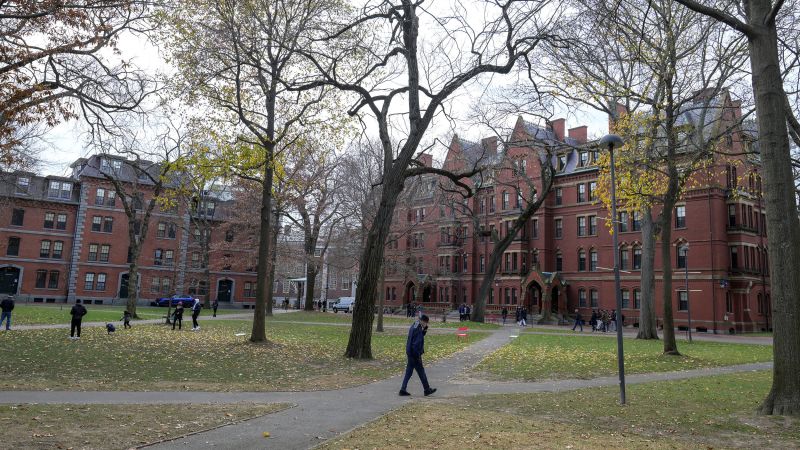New York
CNN
—
Undergraduate applications to Harvard University dipped to four-year lows for the class of 2028, according to new figures that offer early clues into how the Ivy League school’s reputation has held up during a period of historic turmoil.
The application figures are also the first look at Ivy League school admissions after the Supreme Court gutted affirmative action, although the data does not include demographic breakdowns.
Harvard said Thursday it received 54,008 applicants for the class of 2028, down 5% from the year before.
This marks the fewest applicants to Harvard since the class of 2024’s enrollment period during the Covid-19 pandemic. However, the total is still the school’s fourth highest total number of applicants in its history.
Applications hit a record high of 61,220 two years ago and have since declined but remain well above last decade’s levels.
Harvard said it accepted 1,937 students for the class of 2028, translating to an admissions rate of 3.58%. That’s up from last year’s rate of 3.41%, which was the second-lowest in school history. The all-time low admissions rate was set just two years ago at 3.19%.
The numbers suggest demand to attend Harvard has not weakened dramatically in the wake of recent turbulence on campus. The storied university found itself in a full-blown crisis last fall as its response to an anti-Israel letter was strongly criticized by some powerful alumni and politicians. The school has also been accused of antisemitism and Islamophobia.
Claudine Gay, the first Black president in Harvard history, stepped down in January amid a firestorm of controversy over her academic writings and disastrous performance at a congressional hearing on antisemitism.
Two other Ivy League schools navigating controversy, the University of Pennsylvania and Columbia University, experienced jumps in applicants.
Columbia University, another Ivy League school that has faced scrutiny over its response to antisemitism, announced Thursday its applicant pool increased by 6% to 60,248. That marks the third-highest number of applicants in Columbia history.
Columbia’s admission rate dipped, falling to 3.85% from 3.93% a year ago.
Despite controversy at the University of Pennsylvania, it said received it received more than 65,000 applicants – the largest first-year applicant pool in the school’s history. In contrast, last year it received 59,465 applicants and offered admission to about 6% of them.
In December, Liz Magill stepped down as UPenn’s president after struggling to answer questions during a congressional hearing about whether calls for genocide against Jews would violate the university’s code of conduct.
Cornell University admitted 5,139 students this year, but it does not disclose how many students applied.
Brown University also had a dip in applicants compared to last year – in 2023, 51,316 people applied, while this year the school had 48,898 applicants. This year still had the third-largest applicant pool in history, Logan Powell, associate provost for enrollment and dean of undergraduate admission, said in a release.
The class of 2028 marks the first admissions cycle after the US Supreme Court took an axe to affirmative action in college, ruling the Harvard and University of North Carolina admissions programs were unconstitutional.
Harvard remains locked in a battle with the House Education and Workforce Committee, which is investigating campus antisemitism. Rep. Virginia Foxx, the Republican chairwoman of the committee, has accused Harvard of failing to comply with an unprecedented subpoena for documents.
Early applications at Harvard fell by 17% to four-year lows, the university announced in December. The acceptance rate increased to 8.7%, compared with 7.6% the year before.
The cutoff date for early admission at Harvard was November 1, preceding Gay’s testimony before Congress on antisemitism and plagiarism scandal.


